Covid in Scotland: Anger as Glasgow and Moray remain in level three
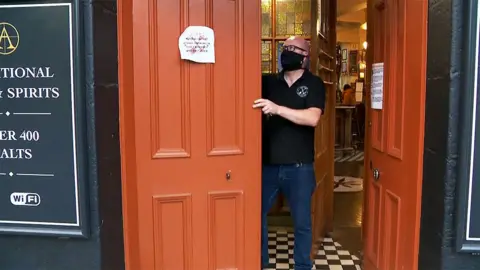 BBC
BBCEuphoria at the return of indoor hospitality and hugging has not reached every part of Scotland.
While most of the country went into level two and most islands skipped to level one, Glasgow and Moray remain under tighter restrictions.
Hospitality businesses have expressed anger at the 11th hour change of heart.
And concern mounts in East Renfrewshire which now exceeds Moray's Covid case rate but has been allowed to ease restrictions.
Last Tuesday, First Minister Nicola Sturgeon said that all mainland areas with the possible exception of Moray were expected to move to level two rules this week.
But on Friday she announced that the move to level two would be delayed by a week for both Moray and Glasgow after cases rose rapidly, particularly in the south of the city.
It means bars and restaurants in Glasgow and Moray will not be able to serve alcohol indoors and they will have to close their doors to indoor diners at 20:00.
Donald Macleod, convenor of the Glasgow Licensing Forum, believes hospitality is being "treated with contempt".
He said: "I am happy for those who can open but I feel desperately sad and sorry for all those in Glasgow on what should have been a happy Monday, has become a very blue, dank, dreary Monday.
"It's a terrible situation to be in with a £1m-a-day bar bill being foisted upon the city because of wasted stock, staff coming off furlough, preparation - it's a total disgrace.
"Cases go up but mortality rates don't, hospital admissions don't and yet we are locked down. There is no run on the NHS. We should not be shutting down an economy, a whole city.
"Many are going to go out of business."
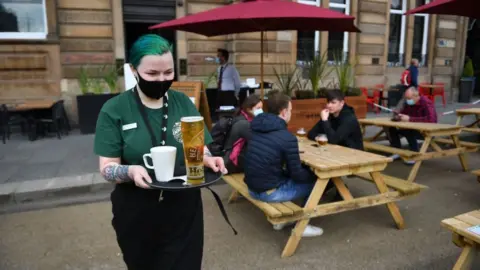 Getty Images
Getty ImagesMario Gizzi, owner of the DRG group, which owns bar and restaurants in Glasgow and other parts of Scotland, said Friday's decision to keep the city on level 3 has already cost his business thousands of pounds.
He said: "We were given no time to prepare for this.
"Last week, at just one site in Glasgow - the Citizen - we spent £6,000 in staff costs getting ready for reopening and another £6,000 in fresh produce which we can't use now.
"I've also had to pay for extra staff in our call centre to cancel all this week's bookings.
"It's an absolute disgrace."
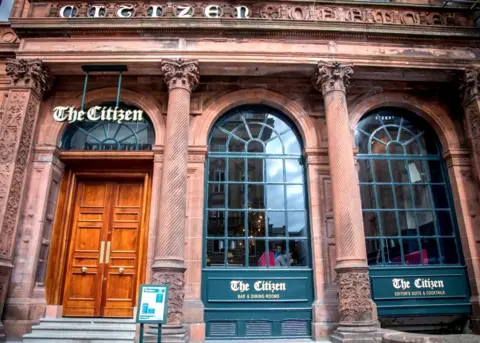 DRG group
DRG groupMeanwhile The Scottish Tourism Alliance (STA) and UK Hospitality have written to the first minister asking her to address the challenges faced by tourism and hospitality businesses in Glasgow and beyond as a result of the city remaining in level three restrictions, with the added travel ban.
The groups say a significant part of the industry and its supply chain have been plunged into crisis.
They are calling for more financial support and highlighted urgent issues such as the costs involved in preparing to reopen, waste of stock and the mental health of employers and employees.
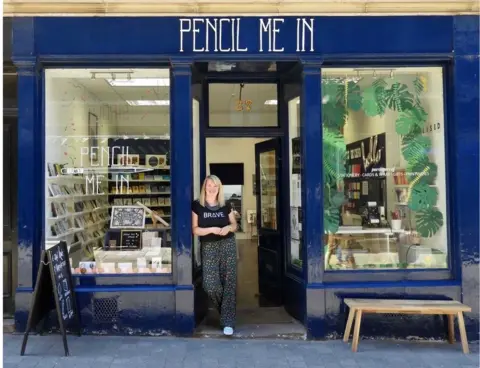 Pencil me in
Pencil me inIn Moray, Sarah Holmes, who has run Elgin's Pencil Me In for five years, has expressed her frustration at remaining in level three.
"It is frustrating when you see all the happy freedom stories today", she said. "I don't disagree (with that decision), but the travel restrictions massively impacts tourism in Moray.
"I feel we need to ride out this week. Online is only about 30% of our turnover, most is in store - the reason I have a shop is I like the customer connection".
She said she was "quietly confident" that Moray's infection rate would have fallen enough by the end of the week to justify an imminent move to level two.
'Keeping Glasgow at level three made us feel safer'
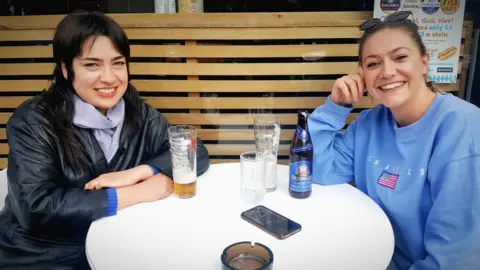
Cousins Johanna and Sean enjoyed drinks outdoors in the southside of Glasgow - despite much of the mainland being able to order alcohol indoors.
The two agree that planning catch ups with friends and family has been more difficult due to ongoing restrictions in the city - and are often beholden to the elements.
Johanna said: "When it's sunny Queen's Park is really busy and you feel like there's an atmosphere in the community then - but that's been few and far between recently."
"The weather has been absolutely heinous so I was looking forward to not being freezing," added Sean.
"But I feel like people have been friendlier - what I've noticed is everyone working in hospitality has been really professional in making us feel very safe but I actually think people in general are a bit kinder to each other."
Disappointments aside, Sean said that living with restrictions has become the "new normal" and that she believes the decision to keep Glasgow in level three was the right one.
Johanna added: "The response was really quick. I'm getting my vaccine earlier because of that and it shows there is some responsibility there. It makes you feel safer knowing they've made that decision."
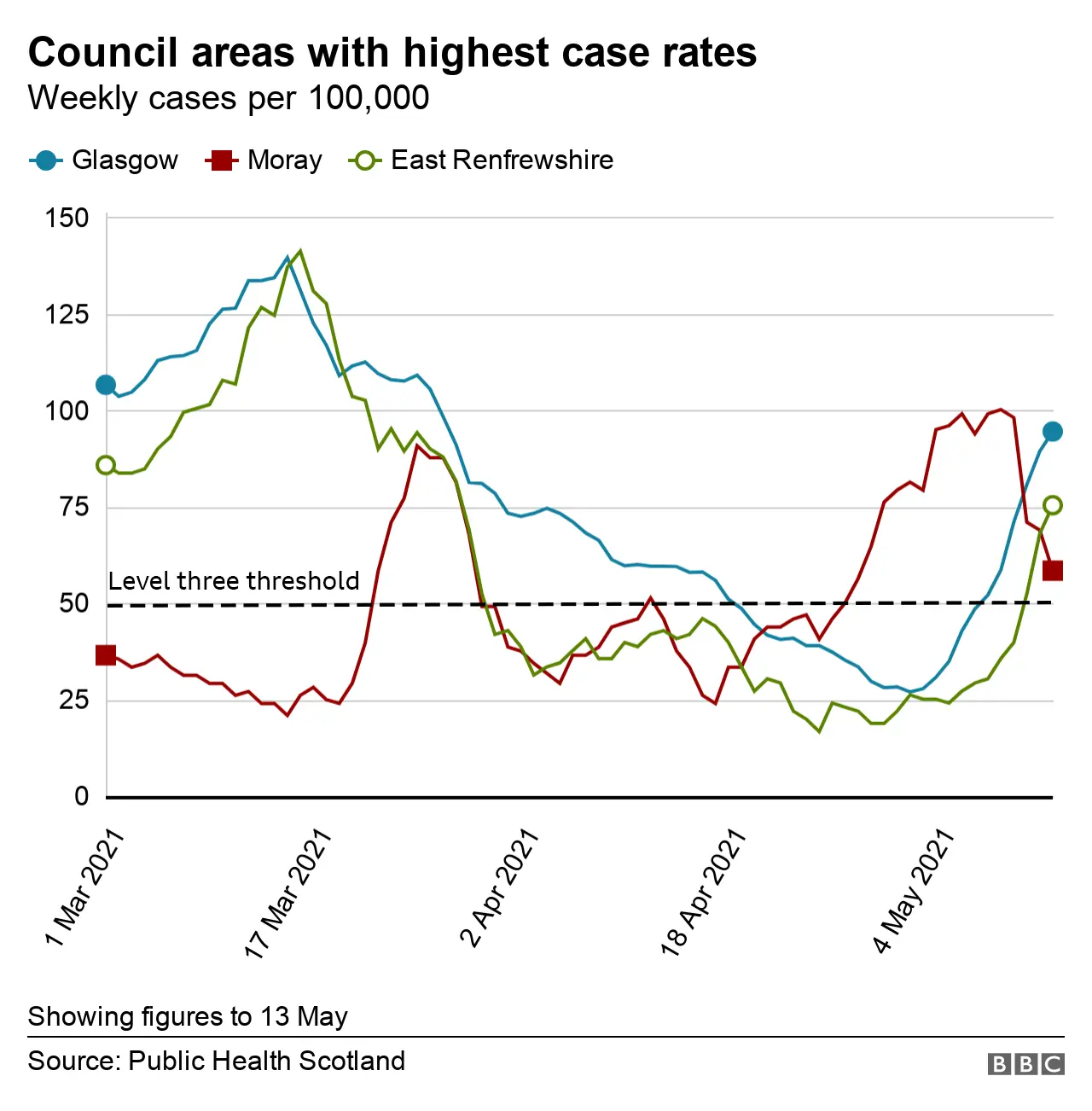
Both Deputy First Minister John Swinney and Jason Leitch, the national clinical director, have described the Covid situation as "fragile".
Mr Swinney told BBC Radio's Good Morning Scotland that every local authority was being monitored and restrictions would be applied to contain outbreaks, if necessary.
But he added: "The last thing we want to do is to have local authority areas going in and out of restrictions like a yo-yo, that's the worst of all possible models for the business community and the wider community."
Meanwhile Prof Leitch warned on Sunday that Glasgow might have to remain under level three restrictions for longer if the rise - which is being driven by the so-called Indian variant - shows no sign of abating.
The latest seven-day average per 100,000 population in the city is 94.5 cases, well above the level two benchmark of 50 cases.
Eyes are also on East Renfrewshire, which has seen its case rate overtake Moray.
It emerged on Monday that people in Glasgow between the ages of 18 and 39 were now being invited to get their vaccinations sooner than previously planned.
NHS Greater Glasgow and Clyde said it would be targeting the city areas of Battlefield, Gorbals and Hutchesontown, Govanhill, Aikenhead, Kingston West and Dumbreck, Maxwell Park, Mosspark, Pollokshields and Strathbungo.
The health board also said plans were being finalised to bring forward second vaccinations for over 50s.
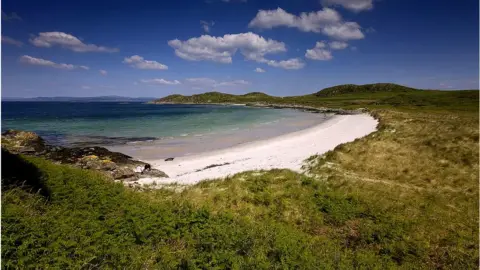 Getty Images
Getty ImagesResidents of Gigha, which is among those Scottish islands which has not moved down to level one, are also disappointed.
The island's heritage trust welcomed the further relaxation of Covid rules, but said islanders had worked for more than a year to suppress the virus and had hoped to move down to level one.
A trust said the island had been lucky to have no Covid cases and, while there was some nervousness around the return of visitors last summer, there were businesses on Gigha highly reliant on tourism.
A spokesman for the Scottish government said: "Islands that are easily reachable from the mainland, including Bute, Skye and Cumbrae as well as Gigha, will remain in level two to prevent transmission of the virus.
"We have always said we will keep plans under review and accelerate the lifting of restrictions as soon as it is safe to do so."


